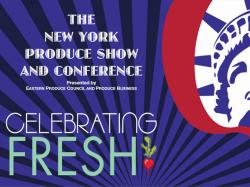Expert Panel Responds To Consumer Perceptions Of Local At New York Produce Show And Conference
December 10, 2015 | 3 min to read

For consumers of fresh produce, the saying "perception is reality," often holds true. Whether or not the consumer is correct in the assumption that local is fresher or organic is healthier, it is what he or she believes that will influence the decision to buy produce from a website, grocery store, farmers market or superstore.
Jim Prevor, PRODUCE BUSINESS editor-in-chief and the moderator of the discussion that kicked off the New York Produce Show at the Jacob Javits Convention Center, called the panel a gathering of the produce industry's great minds. The 12 men on stage at the Keynote Breakfast were: Johan Dique, group managing director, Capespan Group Limited; Marc Goldman, produce director, Morton Williams Supermarkets; Derrick Jenkins, vice president of produce and floral at Wakefern Food Corporation; Paul Kneeland, vice president of fresh merchandising for Fresh Formats; Gualberto Rodriguez, president Caribbean Produce Exchange; Anthony Sattler, vice president of produce procurement for C&S Wholesale Grocers; Vic Savanello, president of the Eastern Produce Council and director of produce and floral for Allegiance Retail Services; Jay Schneider, produce/floral produce lead at Acme Markets; Eric Stone, produce category manager, Fresh Direct; John Vasapoli, director of produce marketing for D'Agostino Supermarkets. Greg Veneziano, director of produce and floral for Bozzutos Inc.; and Tim York, president of Markon.
During the New York Produce Show, PRODUCE BUSINESS magazine sent a video team to Union Square Farmers Market to ask customers about their buying choices. The panel discussed the consumers' perception of produce safety; the definition of local; when and why frozen or canned is preferred to fresh; and advice for grocery store managers. Here is a sampling of the comments made from the videotaped consumers and the panelists’ responses.
Q: Is it safer to buy fresh produce retail, online or at a farmers market?
Consumers interviewed said produce at the farmers market is "truly fresh" and has not been treated with pesticides.
"In the grocery store, you have no idea," said one customer. "There is only one middle man between the truck and my home. Buying at the farmers market means less steps to get there."
Q: What concerns you about buying fresh produce in your local grocery store?
The answers from those surveyed varied: they worried about how local and traceable the product is, along with unnecessary extras like Styrofoam and chemicals.
"They try too hard to make them all look the same, and I worry about there being too much waste in the end."
"They use too much packaging rather than selling them loose."
"Not knowing whether the produce has been sprayed or chemically enhanced to look better, which may render it less nutritious," was another concern.
Citing the fact that consumer perception is not always correct, Prevor asked Tim York, president of Markon, a produce purchasing and marketing cooperative, to comment on such perceptions.
"It's easy for us to sit on our high horse and say, 'Oh, the poor ignorant consumer. We'll have to tell our story better and straighten them out.' The reality is we can't tell the story and we can't expect the consumer to know the difference [between what is safe and unsafe]," says York, who has been on the forefront of food safety issues in his capacity with the Produce Marketing Association and as the chairman of the Center for Produce Safety Advisory Board. "Let them believe that. We have to do everything in our power to follow the cold chain and keep the food safe. It is up to us to figure out how to deliver that flavor, texture and experience to the grocery store."
Q: What does local mean to you?
"It's grown in New York, not Peru or somewhere else."
"Within the tri-state region, from New York or New Jersey."
"Within 5 or 10 miles from where I live."
The EPC's Vic Savanello said: "If you ask 100 people that question they will give you 95 different answers. They perceive local as being produce that doesn't spend as much time en route — like something coming from the West Coast or Mexico. 'Local' is not clearly defined."
“The consumer is often unaware of the challenges of a retail chain to buy local,” said Jay Schneider of Acme Markets in Philadelphia. "If there is an apple orchard 5 miles from the store the customer wants to know, 'Why can't you get those apples?' It's tough for a large chain to manage that with 15, 25, 30 small growers. The company may not be USDA GAP-Certified and its executives may not know how to become GAP-certified. Retailers put themselves at risk when they start dealing with little growers that are not GAP-certified — even if that's what customers want. If something happens to our store, it could be devastating, and I take that very seriously."
Source: PerishableNews.com
